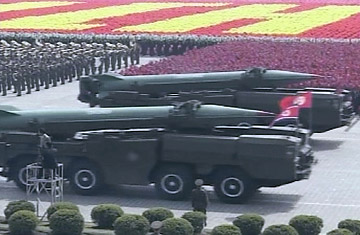
Missiles are carried during a massive military parade in Pyongyang, North Korea, April 25, 2007.
Correction Appended: April 2, 2008
One month ago, American diplomats, journalists and sundry high-ranking North Korean officials sat together in a concert hall in Pyongyang, listening to the New York Philharmonic orchestra perform for the first time in the communist capital. Television audiences around the globe caught snippets of the televised event and saw a friendlier side to the least understood nation in the world.
But this week, Pyongyang hasn't been quite so accomodating. Today, it test-fired another missile (the fourth since 1998) toward South Korea — this time on the west coast toward China. Pyongyang also warned Washington to get off its back about an alleged uranium enrichment program, saying if it didn't, North Korea might not become a nuke-free country. On Thursday, Pyongyang told a dozen South Korean officials working at the Kaesong Industrial Complex, a joint Korean economic zone situated just north of the DMZ, to pack up and go back to Seoul. "[North Korea is] ratcheting up the pressure," says Lho Kyongsoo, a professor of international politics at Seoul National University.
It is no mystery why. This week, South Korean President Lee Myung Bak and his new government started to lay the ground rules for future dialogue with the North. "North Korea is just trying to discipline the new unification minister [of South Korea]," says Professor Moon Jung In, at Yonsei University, referring to Kim Ha Jong, the South's key policy maker on the North. His agenda will presumably be a reflection of Lee's election platform, which took a harder line against Pyongyang than previous South Korean governments.
President Lee's government was not being cowed, however. His Foreign Minister, Yu Myung Hwan, in a meeting with Condoleezza Rice this week, said that Seoul was "running out of time and patience" with Pyongyang over the North Korean nuclear issue. On Wednesday, President Lee himself warned that he would speak out against human rights abuses in North Korea; an issue avoided by the past two liberal administrations, and would not expand ties with the country until it abandons its nuclear weapons program.
Unlike his predecessor, Roh Moo Hyun, Lee also promised to pursue the issue of South Korean citizens kidnapped by the North, and would vote for a United Nations Human Rights Council resolution this week to look into Pyongyang's human rights abuses. Sohn Kwang Joo, an editor at the Daily NK, an online newspaper focusing on North Korea, is confident Lee will continue to press the North, but adds, "Kim Jong Il will react negatively."
With the bumpy start, the question on many minds is whether Lee's "get tough" policy will work with Pyongyang. "I'm hopeful it will, but the timing is a little difficult," says Lho. Lee's conservative party is facing crucial parliamentary elections on April 9 and desperately needs a majority in the national assembly for the new president to realize many of his policy aims, including denuclearizing the peninsula. North Korea, analysts suspect, will want to put pressure on Lee's policy toward the North, to prevent him from getting off on a normal footing and thereby affect the vote at the polls.
For now, Washington and Seoul are focusing all of their energies on getting North Korea to provide a full list of its nuclear activities, including a suspected uranium enrichment program. It promised to do so by the end of last year, but is now four months late. There are also the Six-Party Talks to help Lee realize his North Korea policy objectives as well. "But the prospects for opening those talks don't look very good," says Paik Haksoon at the Sejong Institute in Seoul.
The article originally misidentified Sohn Kwang Joo.
